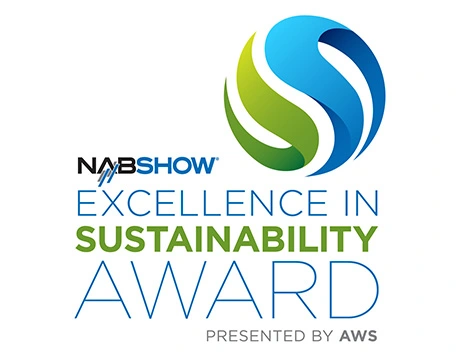TL;DR
- Barbara Lange founded a consultancy that specializes in helping media technology companies form and enact sustainability plans.
- Lange bases her sustainability beliefs in part from the United Nation’s Sustainable Development Goals, updated in 2015.
- Sustainability efforts extend beyond climate advocacy. Gender equity is one such area that Lange is passionate about as a woman in tech.
Barbara Lange is the founder and principal of Kibo121, a boutique consultancy focused on guiding media tech companies in taking practical steps on their path to sustainability. She recently completed 12 years as the executive director of SMPTE. Prior to SMPTE, Lange built a career in scholarly publishing at Springer-Verlag and IEEE.
Watch the interview (above) or read the following summary of our conversation about sustainability in the M&E industry.
By addressing sustainability, you’ll make your business more attractive to your customers, to your investors, and to your workforce.
Barbara Lange
Understanding Sustainability
“I define sustainability as meeting the needs of the present without compromising the ability of future generations to meet their own needs. It’s actually what the UN defined sustainability as in 1987, when it really started becoming part of our lexicon,” Lange explains.
“I also go further and look at sustainability as the intersection between the environmental, social and economic influences because you can’t have one without the other.”
Specifically, Lange notes, “We can’t build a sustainable environment without considering the impact on society and the economic drivers.”
Much of her thinking is based on work generated by The United Nations. The UN drafted 17 Sustainable Development Goals in 2015, which they have committed to achieving by 2030.
“Look at the UN’s 17 Sustainability Development Goals,” Lange says. “You’ll see that it’s a breath of issues that include all sorts of aspects of humanity, from equal access to education and gender equality, as well as the typical environmental goals.
“So sustainability …encompasses all these other parts of the social good.”
For Lange and her work at Kibo121, she views “sustainability as much bigger than addressing just the carbon footprint. And while that is an essential part of our sustainable future, we have to look at the bigger picture of how it impacts society and the economics.
“And I personally, as a woman in a technology space, also want to encourage and empower young girls to enter into high tech fields, and that also feeds into those sustainability goals.”
READ IT ON AMPLIFY: Nominations Are Open for the NAB Show Excellence in Sustainability Awards
READ IT ON AMPLIFY: Why Live Production Has to Up Its Sustainability Game
Strategic Planning
Lange understands that sustainability still needs selling. It’s part of her core mission, and she understands that organizations need to view the business case, not just the moral implications.
“Climate change and sustainability are the issues that are critical to your business’s future. And it’s here now, and we can’t avoid it,” Lange says in her elevator pitch. “So by addressing sustainability, you’ll make your business more attractive to your customers, to your investors, and to your workforce.
Your sustainability plan must be “integral in your business, and that means being integral into your strategy and your workforce,” Lange explains. “And it really becomes a new way of life. And I think that’s what’s so exciting about it, because you just you’re being mindful about sustainability as an essence around your business activities.”
“So even if you don’t believe in the data [related to climate change], operating your business more sustainably is also going to offer you efficiency gains, which naturally will reflect in cost savings.”
So how does an organization go about creating and implementing a sustainability plan? Lange works on a five-point plan:
- Form a Green Team. They will be in charge of understanding and then managing the situation as it is on the ground.
- Benchmark sustainability efforts. Take quantitative and qualitative assessments. This will help you to understand your basement energy consumption and identify where it’s possible to adjust.
- Plan, set goals, and prioritize.
- Track your progress and analyze results. Make necessary adjustments.
- Celebrate your achievements! This should apply to all the various stakeholders: coworkers, suppliers, customers, and others.
Lange says, “Then you do it all over again, because it’s like I said, you’re starting a journey that becomes a new way of life.”
Lange notes, “It’s actually not all that different than what we do on a regular daily basis in terms of business strategy and such. But it is mindful to include sustainability at every step of the way. So as you develop a new product or service, you think about the financial budget. Now you have to think about the carbon or sustainability budget, as well.”
Initially, Lange explains, you’ll probably tackle your carbon footprint. “You really have to look at your business and including the value chain from your suppliers to your customers and understanding how your operations work and where you can find those those low hanging fruit.”
“Some of the low hanging fruit is… about efficiency gains.” That can be as simple as switching off lights and turning off and unplugging unused computers, which “can have a significant impact. And it also then saves you money, which is always a good thing too. So other ideas are around travel and the use of technology. As you dig deeper into such things, you can see how how are your systems actually set up.”
Digging deeper, you’ll want to investigate: “Are you using cloud services versus on prem? Are you using bespoke hardware versus off the shelf? Are you using standard industry standard standards versus proprietary processes? All of these things can contribute to the understanding of your current situation and then how you can make adjustments going forward.”
Where We Are Today
“It’s a global problem, but it’s not being addressed at the same pace around the world. I would say that Europe is definitely ahead of the game in this in this area. And so what we see is that that happens because there are a lot of regulations that the EU has and mandates that require organizations to address sustainability and disclose carbon footprints and other measures so that those requirements really do make a difference.
“And you can see the changes. Also in Europe, they have a different situation with the energy crisis as a result of the Ukrainian war. And so there are different reasons that these are drivers. What we see here in the US is that we don’t have those requirements. But there are there are certainly different drivers. And even if we don’t have those specific requirements as they do in the EU, there are things happening in the United States.
“Firstly, President Biden’s inflation reduction Act, which passed last fall, is probably the single largest investment in climate and energy in American history, and it’s enabling lower energy costs and incentivizing the adoption of clean energy technology to combat climate change. And that’s happening both at the business and at the private homeowner level. So that’s really inspiring. The other is the Securities and Exchange Commission.
“The SEC, which is responsible for regulating public companies, is about to make a change that will require listed companies so public companies, to file sustainability metrics along with their financial filings. I believe that these two actions will get the U.S. business really more tuned in and driving towards a new sustainability pathway. Finally, I would also say that the next generation of workers are going to be big drivers for change as they think about their future, their careers, their workplaces.
“They will be a positive impact, I think, for business to behave in a more corporate, responsible way and really help push this towards that goal of net zero by 2050. So there’s not a lot of time to get there.”
NAB Show Sustainability Awards
The 2023 NAB Show will celebrate industry sustainability efforts with the inaugural Excellence in Sustainability Awards.

Sponsored by AWS, the program comprises three honors:
- The Sustainability Champion Award will be given to individuals driving sustainability efforts and programs.
- The Sustainability Leadership Award will recognize organizations that have launched or completed sustainability initiatives in the past 12 months.
- The Sustainability Product or Service Award is for products or services launched in the past 12 months that significantly improve sustainability or provide sustainable market alternatives.
Nominations will be accepted through April 3.
SUSTAINABILITY ACROSS M&E — BUILDING FOR NOW AND THE FUTURE:
Media & Entertainment has a big environmental impact — think carbon emissions, waste and energy use. The video entertainment industry’s carbon footprint has surpassed even that of the airline industry, prompting technology developers and other companies to step up with innovative approaches and practices. Explore handpicked articles from NAB Amplify to discover why sustainability is the number one priority for M&E, along with the latest trends in creating a greener future:
- Yes, Video Is Terrible For the Planet… But We Can Change That
- Can AI Reduce Carbon Emissions?
- Here’s Why (and How) Terrestrial TV Distribution Is “Greener” Than IP-Delivered Content
- How to Grow Sustainability in Media and Entertainment
- Why Live Production Has to Up Its Sustainability Game


